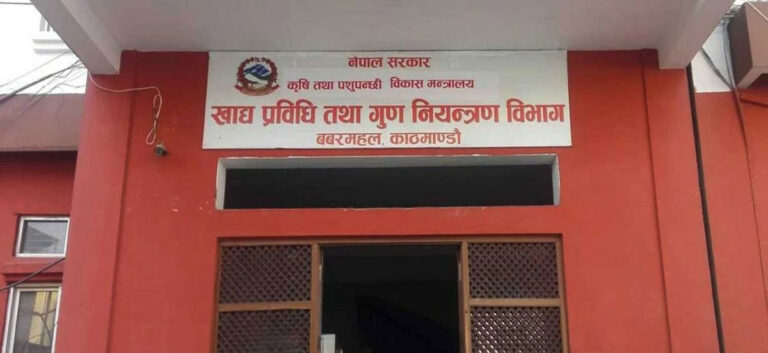Kathmandu: In a major milestone for Nepal’s food quality and safety sector, the Department of Food Technology and Quality Control (DFTQC), under the Ministry of Agriculture and Livestock Development, has announced that its National Food and Feed Reference Laboratory (NFFRL) has secured international accreditation to test 814 parameters across 22 food groups.
The announcement was made during a press conference held on Sunday.
According to DFTQC Director General Sanjiv Kumar Karna, the lab recently received accreditation from India’s National Accreditation Board for Testing and Calibration Laboratories (NABL), which now recognizes 272 chemical and 142 microbiological parameters—totaling 814 parameters.
This accreditation ensures that the lab’s test reports are now mutually recognized globally, including by international food regulatory authorities and NABL.
In addition, India’s Food Safety and Standards Authority of India (FSSAI) has granted further recognition to NFFRL for testing 538 chemical and 142 microbiological parameters, allowing it to perform 680 tests that meet international standards.
The lab is now accredited to test a wide range of food safety and quality parameters, including 123 parametres for pesticide residues under food additives and contaminants, 11 for food colorants, 3 for artificial sweeteners, 6 for food preservatives, 4 for vitamins, 19 for minerals and metals, and 8 for aflatoxins.
These capabilities cover products like fats and oils, cereal products (rice, wheat, maize, millet), cardamom, tea and coffee, fruit juices, jams and jellies, pickles, candies, instant noodles, ginger, fresh vegetables and fruits, milk and dairy products, honey and sweeteners, meat products, spices, chhurpi (hard cheese), processed drinking water, and dietary supplements.
With this accreditation, Nepali entrepreneurs can now export directly to India based on certification issued by NFFRL—eliminating the need to test goods in Indian cities like Kolkata, Bangalore, Nagpur, Mumbai, Bhopal, and Delhi.
Director General Karna noted that this international recognition has led many exporters to opt for testing services within Nepal. “India has granted mutual recognition of our lab’s results until March 2027, after which renewal will be considered based on further evaluation,” he stated.
According to department spokesperson Mohan Krishna Maharjan, the lack of local recognition previously forced exporters to send their goods to India for testing—often taking over a month and costing up to Rs 50,000 per item.
Meanwhile, the DFTQC’s food testing laboratory in Biratnagar is also in the process of obtaining international accreditation to test 46 parametres across 9 food groups, which will further decentralize quality testing services across the country.
This landmark accreditation marks a historic step forward for Nepal’s agri-food export industry and food safety regime, reducing trade barriers and enhancing competitiveness in the international market.



Comment Here